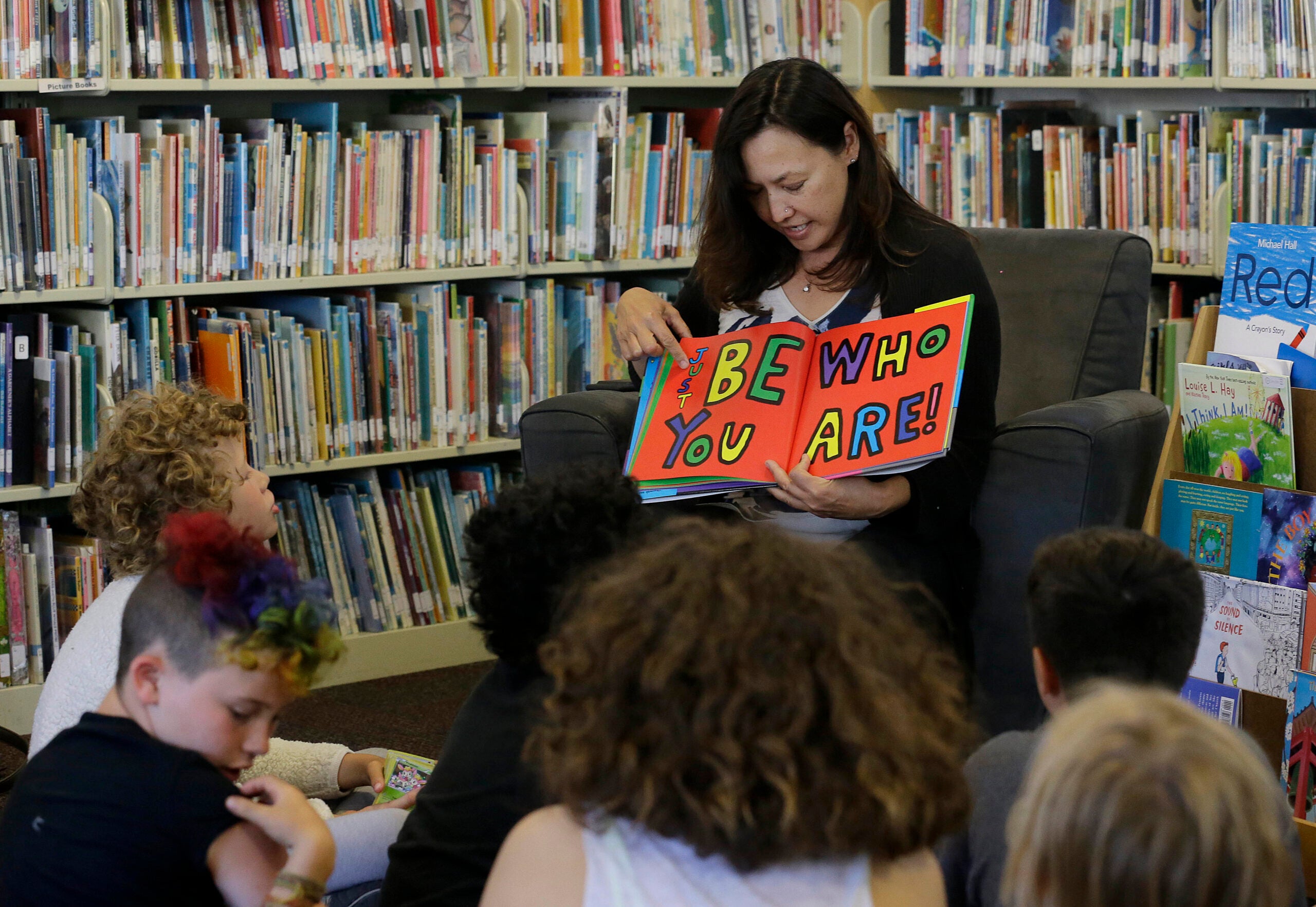Republican Tim Michels is attacking Democratic Gov. Tony Evers and the Wisconsin Department of Public Instruction over a 2018 document regarding transgender preschoolers. The agency says the information is aimed at creating inclusive spaces for all children, and an advocate says the Republicans are “scoring political points off the backs of trans and queer youth.”
In a Wednesday press release, the Michels campaign railed against a document on the DPI’s website titled “Resources for Gender Expansive Preschoolers,” that consists of links to YouTube videos of parents talking about their transgender children. It also includes links to transgender youth advocacy groups and books for adults and kids.
Michels, the GOP candidate for governor, said Democratic Gov. Tony Evers has “betrayed parents across Wisconsin” for staying silent while the DPI “uses our public schools to indoctrinate 3-year-olds with radical gender ideology.”
Stay informed on the latest news
Sign up for WPR’s email newsletter.
“This is wrong,” he said in the release. “(Evers) has had his chance to prove that he’s moved beyond the education establishment, but this proves he will always choose fringe social agendas while kids are left behind.”
Michels said tax dollars “cannot finance the instruction of radical gender ideology.”
In a statement, Evers campaign spokesperson Sam Roecker said the governor “knows parents are the first and best teachers our kids have” and it’s up to them to decide what conversations to have with them.
“Republicans have to stop using our kids as political pawns and working to bring divisive, radical policies into our classrooms,” Roecker said. “More division only hurts our kids, which is why Gov. Evers will continue to be focused on getting our kids caught up and making sure they have the support and resources to be successful.”
DPI Director of Communications Abigail Swetz said the document Michels is referring to was a handout from a 2018 conference focusing on best practices for early childhood learning and is not a mandated part of curriculum for Wisconsin school districts. She said the information was aimed at offering resources to school districts, which set their own curriculums, to ensure safe and welcoming learning environments for transgender and nonbinary students while teaching all kids about respecting differences.
“The world at-large is not always safe and welcoming for LGBTQ kids,” Swetz said. “We need to remember that our kids are listening. … And I think we have to ask ourselves, are we a safe and welcoming state for all kids? I really want that answer to be yes.”
On Friday, the campaign of GOP U.S. Sen. Ron Johnson also brought up the DPI document, which was included in an article by the conservative site The Daily Caller, by way of a “question of the day” for his Senate opponent, Democratic Lt. Gov. Mandela Barnes.
“Why are you and Gov. Evers allowing the Wisconsin Department of Public Instruction to promote transgender resources and suggested reading material geared towards preschoolers?” said a campaign press release.
Because the DPI is led by an independently elected secretary, neither Barnes nor Evers have direct authority over the office.
Brian Juchems is a co-executive director of GSAFE, an advocacy group focused on creating “just schools for LGBTQ+ youth in Wisconsin” that was linked to in the DPI resource document. He told WPR the attacks by Michels and Johnson are an example of “an expedient way for candidates like the two of them to really drum up their base by throwing our kids under the bus.”
“The reality is that trans and queer kids exist at all grade levels,” Juchems said. “Wishing they weren’t there doesn’t make them not be who they are. This type of rhetoric is scaring and making our youth very nervous around the state, as well as making families nervous and scared for their child’s safety.”
Asked for comment, a Michels campaign spokesperson referred WPR back to his press releases on the issue.
In a statement sent to WPR, Barnes campaign spokesperson Maddy McDaniel said Johnson is “trying to drum up a culture war to grovel to his billionaire donors who back politicians targeting LGBTQ children.”
“If Ron Johnson truly cared about the well-being of preschoolers, he wouldn’t have voted against funding for preschools, free lunches for children during the pandemic and mental health services for children,” McDaniel said. “Instead, he votes against the interests of children, so his billionaire donors can keep their tax breaks.”
As legal and political conflicts play out, data show divide on transgender rights
Criticism from parent groups and conservatives aimed at transgender youth policies and resources at public schools has increased significantly in recent years.
This month, parents represented by conservative groups America First Legal and the Wisconsin Institute for Law and Liberty filed a federal lawsuit against the Eau Claire Area School District over guidance on supporting transgender and gender-nonconforming students. The groups claim parents’ Constitutional rights are being infringed because the district doesn’t require staff to tell parents about students interested in changing names, pronouns or using different bathrooms that match their gender identity.
In September 2021, Republican state lawmakers introduced a bill that would require schools to notify parents before teaching about sexual orientation and gender identity.
In some cases, heated political rhetoric has spilled over into threats of violence.
In May, the Kiel Area School District closed in-person classes and the community canceled a Memorial Day Parade after a series of threats related to transgender student rights. Some threats stated that the community’s City Hall, grocery stores and power stations would be targeted for attacks unless the district dropped a Title IX sexual harassment investigation of three eighth graders accused of targeting a transgender student.
Earlier this year, DPI Secretary Jill Underly issued a statement that said “this is a moment of reckoning.”
“Our students need affirmation and to be connected to their schools and their communities — in our classrooms and in our state,” Underly said. “I believe we have the collective will to support them the way they need to be supported: with welcome and with belonging.”
Underly’s statement pointed to research by LGBTQ youth advocacy group The Trevor Project, which found that youth who report having “at least one accepting adult” were 40 percent less likely to report a suicide attempt in the past year.
Public opinion research shows Americans have complex views on gender identity. Data published by the Pew Research Center in June found most survey respondents favored protecting people who are transgender from discrimination, but many are uneasy with the pace of change on trans issues. For example, the study found that 38 percent of adults felt society has “gone too far” in accepting people who are transgender, while 36 percent believe society hasn’t gone far enough.
The Pew data show the greatest portion of those who felt society was too accommodating of transgender identities were 65 or older, and the largest share of those who feel it hasn’t gone far enough were between the ages of 18 and 29. There were also significant splits between Republicans and Democrats.
In June, the Marquette University Law School released polling that found 46 percent of respondents in Wisconsin favor laws that ban discrimination of individuals who are transgender, while 39 percent opposed such protections.
The survey also asked whether respondents know someone who is transgender. Among those between the ages of 18 and 29, 64 percent said they do know a transgender person, while only 31 percent of people older than 60 said the same.
When it came to participation on sports teams that match an athlete’s gender identity, 62 percent said athletes should only be allowed to compete on teams that match their birth gender.
Wisconsin Public Radio, © Copyright 2025, Board of Regents of the University of Wisconsin System and Wisconsin Educational Communications Board.





